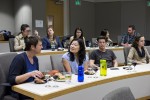Michael Peck spent the summer after his college graduation in a Napa Valley wine cellar, pitching yeast into a grape skin and juice mixture and filling 1,000 barrels with fresh red and white wine.
On his rare days off, he would “sip and spit” his way through six wineries a day in an attempt to stay sober while learning more about wine.
Peck, now an MBA student at the UCLA Anderson School of Management, worked the 2008 harvest taking weekend and overtime shifts for three months straight.
“I really wanted to learn more about the wine world and what makes wine juicy, light-bodied or tannic,” he said.
Nearly seven years later, Peck uses his wine tasting skills as the vice president of winery outreach at the Anderson Wine Club. The group, which currently has about 350 members, formed as a way for Anderson students to socialize outside of school and learn more about wine production and distribution, said Margot Bloch, an MBA student at Anderson and co-president of the the Anderson Wine Club.
The club, which is funded by a $90 annual membership fee, puts on educational events where members can taste wines and meet winemakers, in addition to wine socializing nights in more casual settings, she said.
Earlier this year, Peck and four other Anderson Wine Club members competed in the Left Bank Bordeaux Cup, a national wine tasting regional trial in New York City. Going up against top American graduate schools, the team eventually won and is set to compete in the finals in June, which will be held in France.
At the wine-tasting competition hosted by La Commanderie du Bontemps, a 66-year-old brotherhood made up of Bordeaux wine chateaus and economic players, the Anderson students competed for the first time this year and faced rounds of blind wine tastings as well as 10 trivia questions that tested their historical knowledge of Bordeaux, Bloch said.
“Blind wine tasting was definitely the most difficult part of the competition,” she said. “It’s one thing to taste blatantly different grape varieties such as sauvignon blanc and pinot noir, but this is the same grape from the same small region in France.”
The group members started preparing for the competition in October by studying the seven appellations, or districts in the left bank of Bordeaux, that identify each Bordeaux wine based on the climate, soil and grape variety, she said.
Every wine has a distinct fingerprint that can be fun for the drinker to identify, said Rex White, vice president of events for the Anderson Wine Club. White worked in the wine industry before enrolling in the Anderson MBA program, he said.
“The way the grapes grow in a cold or hot season, the way you pick them, the way you let them ferment,” he said. “It makes a difference to whether you have an acidic wine where the grape didn’t get a chance to fully develop, the singular taste of green peppers or whether you can smell the violets and roses in a wine from Margaux.”
Brooke Matthias, an Anderson MBA student and co-president of the Anderson Wine Club, said she decided to join the group and participate in the competition after taking a wine tasting class at UCLA Extension.
She said she was confident in her team’s performance at the competition, but she didn’t want to be the California kid who embarrassed herself among prestigious East Coast schools.
“They read Massachusetts Institute of Technology’s name, and we thought if we even had a shot, it definitely would have been second,” she said. “We thought it was all over, but then they started reading University of California, Los Angeles and we looked at each other in shock and thought, ‘Wait, that’s us!'”
Their win advanced them to the finals in Bordeaux, France, where they will compete against schools from Hong Kong, Paris, Shanghai and London.
Matthias said many members attend Anderson Wine Club events to socialize and relieve the pressures of business school, but she thinks the skills acquired through the club are valuable in some aspects of the working world.
“When you go out with your co-workers or clients for dinners in the future, it’s important to have some wine knowledge,” she said. “You don’t want to sound like an idiot when you can’t appreciate a good wine.”
The club has seen a rise in membership as students who are interested in non-traditional business career paths, such as the wine industry, join for an opportunity to network, Peck said.
“The wine industry is really a lifestyle business where you don’t get rich like you do in investment banking,” he said. “But for the people who are passionate about wine, this club makes them feel like they are not alone.”
Contributing reports by Shreya Maskara, Bruin contributor.
